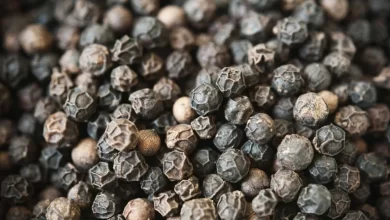Guava is a fruit known for its distinct flavour and nutritional value. It has a unique aroma and a sweet-tangy taste that varies depending on the variety. The fruit is typically round or oval with a green or yellowish-green skin, which may be rough or smooth. Inside, the flesh can range from white to vibrant pink, dotted with small, edible seeds. They are enjoyed fresh, as a juice, or incorporated into various culinary creations like jams, jellies, and desserts. With its refreshing taste and health benefits, guava is a delightful tropical fruit enjoyed by many around the world.
- Guava is a tropical fruit that is native to Central America and is now cultivated in many tropical and subtropical regions around the world.
- There are several different varieties of guava, with the most common ones being the apple guava (Psidium guajava) and the strawberry guava (Psidium littorale). Each variety has its unique characteristics in terms of taste, texture, and appearance. Only In India, there are over 30 varieties of guava that are grown.
- Guava is highly nutritious and is a rich source of vitamin C, dietary fibre, and antioxidants. It also contains vitamins A, E, and K, as well as minerals like potassium, calcium and manganese.
- Guava has a distinct flavour profile that is often described as a combination of sweet and tart. The taste can vary depending on the variety and ripeness, ranging from mildly sweet to intensely tangy.
- Guava fruit contains small, edible seeds that are often soft and gelatinous. These seeds add a crunchy texture to the fruit and are safe to consume.
- The seeds of guava are not only edible but also contain high levels of dietary fibre. Consuming guava seeds can help promote healthy digestion and prevent constipation.
- Guava is known for its numerous health benefits. It supports immune function due to its high vitamin C content, aids digestion with its fibre content, and may have anti-inflammatory and antimicrobial properties.
- Guava leaves have been traditionally used in some cultures for their medicinal properties. They are often used in herbal remedies for managing diarrhoea, reducing blood sugar levels, and improving oral health.
- Guava is known for its exceptionally high vitamin C content. In fact, it contains more vitamin C than oranges. This makes it a valuable addition to a balanced diet, promoting overall health and supporting collagen production.
- Guava is a versatile fruit that can grow in a variety of climates and soil conditions. It thrives in tropical and subtropical regions and is cultivated in countries such as India, Brazil, Mexico, Thailand, and Egypt.
- Guava is a good source of vitamin A, which is essential for maintaining healthy vision, promoting skin health, and supporting immune function.
- Guava has been used in traditional medicine for its potential therapeutic properties. It has been explored for its antimicrobial, anti-inflammatory, and antioxidant effects, which may have applications in treating various health conditions.
- Guava is a low-calorie fruit that can be beneficial for weight management. It is high in fibre, which helps promote feelings of fullness and aids in healthy digestion.
- Guava is a popular ingredient in natural skincare products due to its high vitamin C and antioxidant content. It is believed to help brighten the skin, reduce signs of ageing, and promote a healthy complexion.
- Guava is a versatile fruit that can be enjoyed in a variety of culinary creations. It is used in making jams, jellies, preserves, fruit salads, smoothies, ice creams, and even savoury dishes like salads or salsas.
- Along with its delicious taste, guava is known for its distinct and aromatic fragrance. The pleasant aroma of ripe guava is often described as a combination of tropical and floral notes.
- Guava leaves can be brewed into tea, which is consumed for its potential health benefits. Guava leaf tea is believed to have antimicrobial, anti-inflammatory, and blood sugar-regulating properties.
- Guava leaf tea is known for its calming and relaxing effects. It is often consumed to help reduce stress, promote restful sleep, and alleviate anxiety.
- Guava trees have several environmental advantages. They are hardy, drought-tolerant plants that require minimal care and water. Additionally, guava trees provide shade, contribute to soil health, and attract pollinators with their fragrant flowers.
- Guava is packed with antioxidants such as carotenoids, flavonoids, and polyphenols. These compounds help neutralize harmful free radicals in the body, reducing oxidative stress and promoting overall health.
- Guava leaf extract has been studied for its potential oral health benefits. It has shown antimicrobial properties against bacteria that cause dental plaque, making it a promising ingredient in oral care products.
- Despite being sweet, guava has a low glycemic index (GI). This means that it releases sugar into the bloodstream at a slower rate, making it a suitable fruit for individuals with diabetes or those watching their blood sugar levels.
- The astringent properties of guava make it useful in managing certain conditions. Applying crushed guava leaves or the fruit’s flesh to wounds or minor skin irritations can help soothe and promote healing.
- Guava trees are highly adaptable and can grow in various climates, including both humid and arid regions. They are resilient plants that can thrive in diverse environments, making them a valuable fruit tree in many parts of the world.
- India is the world’s largest producer of Guava, harvesting 25 million metric tons and accounting for 45% of global guava production.
Nutrition Facts of Guava
Here are the nutritional profile approximately 1 cup (165g) or one cup of Guava.
- calories: 112
- Protein:4.2g
- Fat: 1.6 g
- Carbohydrate: 23.6g
- Fiber: 8.9g
- Potassium: 688mg
- Sugars: 14.7g
- Vitamin C: 376mg
- Folate: 81mcg
- Sodium: 3.3mg






